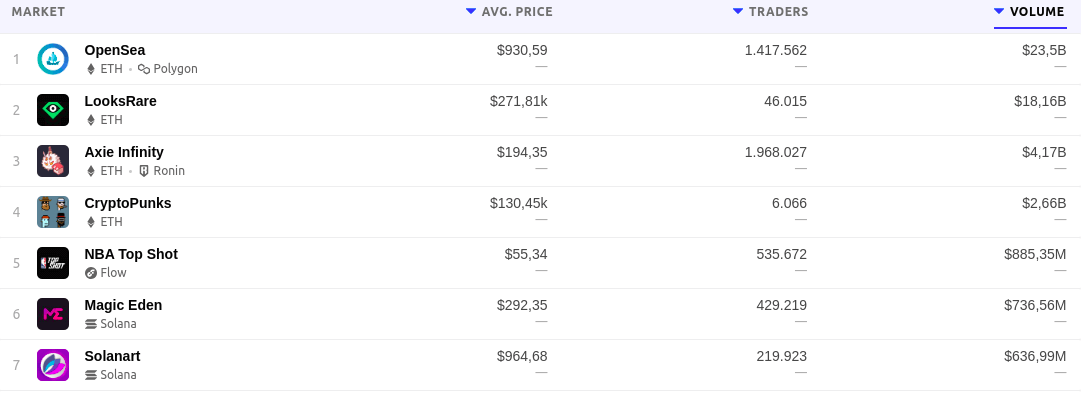With a monthly trading volume in the triple-digit millions, Solana's NFT ecosystem is second only to Ethereum's. Until now, users had to resort to alternative marketplaces such as Magic Eden and Solanart. Now, market leader OpenSea is entering the ring and integrating Solana NFTs as well.
Solana is thus the third Layer-1 and fourth blockchain network after Ethereum, Polygon and Klaytn whose non-fungible tokens (NFTs) can be traded on OpenSea. Among these, Solana is second only to market leader Ethereum in terms of trading volumes. Data from CryptoSlam shows that the total turnover of Solana NFTs reached a major milestone in April, rising to over $1.5 billion - roughly equivalent to the monthly volume of NFTs on Ethereum.
Solana NFTs available on OpenSea
Until now, Solana NFTs have mainly been traded on Magic Eden and Solanaart. With a combined market volume of approximately $1.375 billion over the past six months, the two marketplaces are infinitesimally small relative to OpenSea, the largest NFT trading platform. OpenSea reached a record monthly volume of nearly $4 billion in January, roughly three times the total trading volume on Solana.

Rumors of a Solana integration circulated several months ago, but now OpenSea confirmed the news and announced that non-fungible tokens from Solana can also be bought, sold and transferred on their platform. Their goal, they said, is to engage the Solana community on OpenSea and make Web3 a cross-chain project. Currently, 165 partners who can sell Solana NFTs are listed on OpenSea. Among them are NFT collections such as Nyan Heroes, Stoned Ape Crew and SolSand.
Cheap and fast alternative to Ethereum
Launched in April 2020, the platform can process up to 50,000 transactions per second and transactions cost less than a few centimes on average. Thus, Solana promises a low-cost alternative to Ethereum, whose transaction fees can cost hundreds of dollars in extreme cases. In addition to the NFT collections, a thriving ecosystem of DeFi applications also formed.
However, the focus on scaling also brings disadvantages, especially in the area of decentralization. In September 2021, there was the first attack on the Solana blockchain, which led to a network outage. This lasted for over 16 hours and was an unsettling moment for many participants, whose hands were completely tied for just under a day. As the months went by, these outages became more frequent, causing trust in the blockchain network to suffer. Despite this, a loyal community remained, continuing to actively trade NFTs and interact with DeFi applications.




